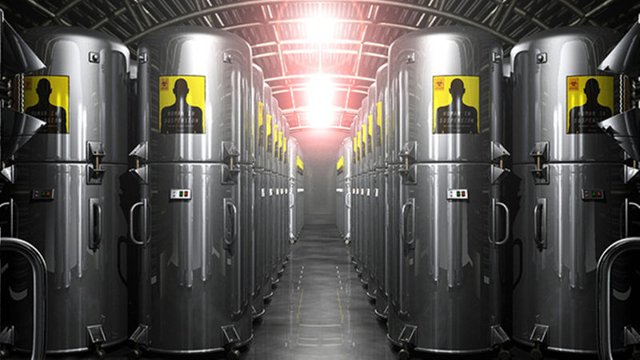
Would you want to be brought back to life after you died? If so, there is a theoretical treatment known as “cryonic preservation,” where a person is frozen at negative 230 degrees Fahrenheit and kept in a freezer for years after they die.
Vote one up if you reminded of Captain America
Then, when technology is invented that can restore their bodies to health, they will be unfrozen and brought back to life! It sounds like pretty wild stuff right? This science-fiction sounding process begs the question: will cryonic preservation even work?
Many enthusiasts say, absolutely! The frigid temperatures stop any bodily chemical processes – like aging – and preserves it, kind of like… well, kind of like meat in a fridge. However, some experts doubt that living twice is possible.
Since humans are made of around 70% water, freezing our bodies would form damaging ice crystals. It’s exactly like placing a plastic bottle in the freezer overnight. When you take it out in the morning, the water has expanded and damaged the bottle! Scientists have tried to replace all the water in the body with special chemicals to stop ice crystals from forming – a process known as “vitrification” – but there is no proof that it works in humans. Cryobiologist Dr. Dayong Gao from the University of Washington, Seattle, said: “We know we can successfully vitrify very small things like insects and simple tissues like blood vessels. This is because the smaller size makes it easier to control cooling and [the vitrification chemicals] can be properly diffused.” However, the process isn’t so easy for the much larger human body. “We simply don’t know if [organs have] been damaged to the point where they’ve ‘died’ during vitrification because the subjects are now inside [freezers].”
If a human did survive being completely frozen, thawing would be another huge problem to overcome. First of all, scientists don’t have an exact way to remove the anti-ice crystal chemicals from our bodies! Plus, different parts of the the body melt faster than others. If one part was heated too much or too quickly, it could be damaged beyond repair. Then, there’s the fact that a frozen human body is insanely brittle! “The body could easily fracture like glass during warming due to thermal stress,” Gao said.
Oh yeah, there’s one last problem. Right before the person was frozen, they died, so they aren’t exactly as healthy as a horse. Won’t they die as soon as they are unfrozen? Even though cryonic preservation is based on the assumption that technology will exist in the future to heal the human popsicles, Gao is doubtful. “A human cell has around 50,000 proteins and hundreds of millions of fat molecules that make up the membranes. Cryopreservation disrupts all of them,” he said.

It’s estimated that almost 200 people have had either part or all of their bodies preserved, and 1,000 more have their name on a waiting list.
will cryonic preservation even work? Know in another Post.